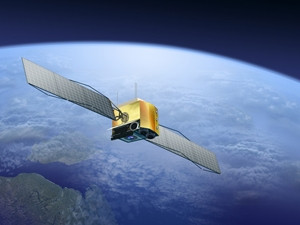
After years of promising to invest in beleaguered satellite company Sunspace, the Department of Science and Technology's R55 million offer to take over the unit, which will be placed under Denel's care, has been accepted by the bulk of stakeholders.
Sunspace went into business rescue as it was not able to pay creditors, and has not paid staff for more than two years. However, Sunspace's current precarious financial position was not caused by the incompetence or neglect of directors or staff, states the rescue plan.
"In fact, just the opposite is true. It is remarkable what the company achieved with the limited financial sources available and with the required government support sadly lacking, notwithstanding numerous decisions and undertakings to do so."
Sunspace is involved in low-earth orbit satellite development, design, building, integration, testing and commissioning. However, it is undercapitalised and was not able to pay creditors. Without government support, Sunspace could not grow and prosper.
Shortfall
Sunspace had tangible assets worth R850 000 when it started, and acquired other assets worth R233 316. Its intellectual property is estimated to be worth R1 million, taking its total assets to R2 million. However, claims against it amount to R5.5 million, including one from the South African Revenue Service for R3.98 million.
If the plan was not accepted, the company would have been placed under liquidation, and it is doubtful the R1 million valuation of intellectual property would have been received, states the plan. At the end of May, it had R1.15 million available for distribution, but claims against it, including salaries and loans, amounted to R151.6 million, leaving a R150 million shortfall.
Accepting the offer would trim the shortfall to R103.5 million.
Delayed investment
The Department of Science and Technology has repeatedly indicated its willingness to invest in the satellite maker, and, in March 2011, Cabinet approved a deal that would see the state take up between 55% and 60%, allowing Sunspace to lean on government to fill its order books, at an estimated cost of R100 million.
However, on 23 October, in response to Parliamentary questions, science and technology minister Derek Hanekom said government investment was contingent on Sunspace presenting a viable business case to demonstrate its long-term sustainability.
"Sunspace management was unable to convince government, through the business plan that they presented, that the company would not continue to require long-term and continued government funding. Government remains committed to retaining the intellectual and human capability and has engaged with Sunspace to achieve this."
Hanekom added that Cabinet had decided continued allocation of state funds through an equity stake would not be in the national interest without long-term sustainability. Just a few weeks before, Cabinet had said it approved that negotiations be entered into with state-owned South African National Space Agency (SANSA) to explore SANSA taking over Sunspace's core capability.
Last May, Hanekom said, in his budget speech, the "process to transfer the capabilities and intellectual property of Sunspace into a continued satellite programme is being pursued through the services of a business rescue plan".
However, at a recent meeting, an overwhelming majority of stakeholders voted in favour of the department's R55 million offer for the entity.
Vital skills
The business plan states the Department of Science and Technology and SANSA see the satellite engineering capability in Sunspace as key for the success of the satellite component of the planned national space programme. Its next satellite will be contributed to the African Resource Management Constellation as part of an agreement with Algeria, Nigeria and Kenya, for which R272 million was set aside this year.
Denel will take over the intellectual property and the bulk of the staff, and operations will continue at the same premises in Technopark, Stellenbosch. A new business unit within Denel Dynamics, which focuses on tactical missiles, precision-guided weapons and unmanned aerial vehicles, will be created.
The first payment should be made by the department on 1 July, with the balance within six months.
While Sunspace will be absorbed into Denel, it is not yet clear what its future holds. The science and technology department was unable to provide comment, while Denel referred queries back to Sunspace, and Sunspace CEO Bart Cilliers has signed a non-disclosure agreement and cannot comment.
Sunspace was set up as a spin-off of the satellite development research programme at the University of Stellenbosch and has undertaken a number of space programmes, including the design, development and manufacturing of SA's second satellite, SumbandilaSat.
Contact with SumbandilaSat had been lost for some time, Sunspace owed staff 25 months' worth of salary, and the plan shows there was only enough cash flow to pay salaries until the end of this month.
If the business rescue plan was not adopted, the company would have been liquidated, and only staff, the landlord and SARS would have received any pay-out. Adopting the plan would improve Sunspace's ability to pay its debt.
Share